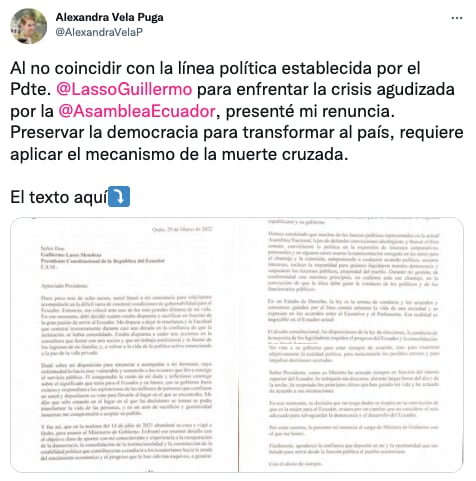
Alexandra Vela, who was in charge of Ecuador's Ministry of Government since July 2021, submitted her resignation for differing with President Guillermo Lasso on how to deal with the governability crisis between the Executive and the Legislative. Vela recommended “cross death”, as is popularly known as the early dissolution of representative powers, but Lasso did not opt for this mechanism, but has announced that he will seek other governance mechanisms such as decrees, agreements and even the possibility of popular consultation.
In an interview with Infobae last week, Lasso said that cross-death was not an option, however, according to Vela, in order to “preserve democracy to transform the country, it is necessary to apply the mechanism of cross-death,” according to Vela, the former minister together with the copy of his resignation.
“I didn't come to your government to always agree, but to objectively examine the political reality,” said Vela, who also detailed in his letter the personal resignations he made to assume the leadership of the Ministry of Government. Vela said she had to give up her life as an academic and give up the care of her brother, who is suffering from a disease.
In her letter of resignation, Vela says that lawmakers made politics “the expression of corporate interests” and that some used the office to blackmail and extort money. The latter coincides with complaints made by President Lasso, who revealed the names of five legislators who would have asked for “economic benefits” in exchange for voting in favor of the investment law proposed by the Executive, which did not win the votes and was denied and filed in the Legislature.
“We have found that many political forces represented in the current National Assembly, far from defending ideological convictions and seeking the common good, turned politics into the expression of corporate and personal interests and in some cases used the representation granted at the ballot box for blackmail and extortion, putting before any political agreement, obscure interests, even impunity for those who liquidated our democracy and looted public resources, owned by the people,” the document reads.

For Vela, in Ecuador, agreements between the Executive and the Legislative are “impossible” because the attitude of legislators “impede Ecuador's progress and the consolidation of its fragile democracy”. In her resignation, Vela explained that the insistence that the president opt for cross death caused “discomfort” in Carondelet and also caused Lasso “disquiet”, for which Vela apologized: “I'm sincerely sorry,” the former official wrote.
With Vela's resignation, it has unofficially become known that not only will she be replaced, but that there will be changes in the structure of the State. Some sources in Carondelet say that Ecuador will once again have a Ministry of the Interior and a Ministry of Politics, both merged during Lenin Moreno's term. The current legislator for the ruling party CREO Francisco Jiménez and Police General Patricio Carrillo would be the new secretaries of state. Jiménez would be responsible for building bridges in the Legislative.
On Wednesday afternoon, Lasso will announce the changes in his cabinet.
Prior to Vela's resignation, it was also known that the spokesman for the Presidency, Carlos Jijón, had resigned from his post. The announcement was made by Jijón himself through his Twitter account.
The Ecuadorian Legislature is one of the most discredited governmental institutions that generates mistrust. The latest opinion poll conducted in 14 cities in Ecuador reveals the Legislature's lack of credibility among citizens, according to pollster CEDATOS. The results indicate that only 11 out of 100 Ecuadorians approve the work of the National Assembly, and only 6 out of 100 trust the legislators word.
KEEP READING:
Últimas Noticias
Debanhi Escobar: they secured the motel where she was found lifeless in a cistern

The oldest person in the world died at the age of 119

Macabre find in CDMX: they left a body bagged and tied in a taxi
The eagles of America will face Manchester City in a duel of legends. Here are the details

Why is it good to bring dogs out to know the world when they are puppies




